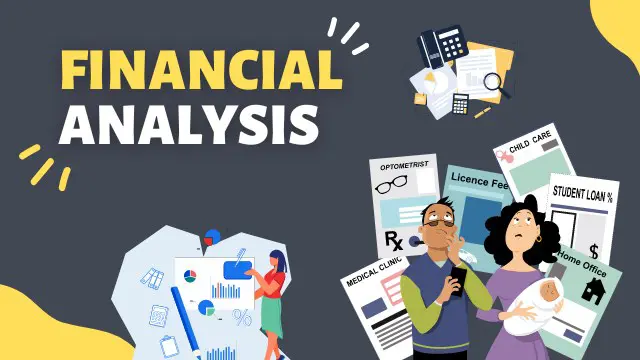
Financial Analysis: Financial Analyst CPD Course
CPD Certified| Free PDF Certificate | Lifetime Access | Learner Support | No Hidden Fees | 100% Success Rate
EDURISE
Summary
- Certificate of completion - Free
- Reed courses certificate of completion - Free
- Tutor is available to students
Add to basket or enquire
Overview
Unlock the Power of Financial Analysis in Business
In today's dynamic and competitive business environment, understanding financial data is paramount. Welcome to a comprehensive Financial Analysis Training that equips you with the essential knowledge and skills to interpret financial information, make data-driven decisions, and fuel your business or career success.
Why Financial Analysis Matters: Financial analysis is the backbone of strategic decision-making in the corporate world. Whether you're an entrepreneur, manager, or professional, the ability to analyze financial data is your gateway to achieving sustainable growth and profitability.
Course Highlights:
1. Financial Fundamentals: Gain a solid foundation in financial principles, including understanding financial statements, accounting methods, and key financial metrics.
2. Ratio Analysis: Learn how to use financial ratios to assess a company's performance, profitability, and financial health.
3. Financial Forecasting: Unlock the power of predicting future financial outcomes and making informed decisions.
4. Investment Analysis: Discover how to evaluate investment opportunities, assess risks, and calculate returns.
5. Industry Insights: Explore industry-specific financial analysis techniques and strategies.
6. Case Studies: Dive into real-world cases that provide practical insights into financial analysis in action.
Who Should Enroll:
- Entrepreneurs: Build a robust financial understanding to drive your business to new heights.
- Managers: Make data-driven decisions and lead your teams with confidence.
- Professionals: Enhance your value by mastering financial analysis and becoming an invaluable asset to your organization.
Benefits:
- Analyze financial data like a pro.
- Make informed decisions with confidence.
- Drive business growth and profitability.
- Understand financial performance on a deeper level.
- Gain a competitive edge in your career or business.
Unlock the potential of financial analysis – the language of business. Enroll in the Financial Analysis Training and take the first step towards a future where you have the knowledge and skills to navigate the financial landscape with ease. No practical training, certificates, or formal qualifications are required to access this wealth of financial wisdom.
Free Gift
- Course Completion PDF Certificate
- Tutor Support
Curriculum
Course media
Description
Learning Outcomes:
Interpreting the Balance Sheet: You will master the art of assessing a company's financial health by dissecting the asset section of the balance sheet, enabling you to identify strengths and weaknesses in its asset management.
Unearthing Liabilities: Learn how to delve into the liabilities section to discover a company's debt structure, potential long-term obligations, and the impact on its financial stability.
Long-Term Financial Planning: Understand the importance of preparing for future financial commitments, and develop the skills to evaluate and plan for long-term obligations effectively.
Income Statement Analysis: Gain expertise in examining the income statement to determine a company's profitability, analyze different sections, and spot signs of profit or loss.
Inventory Cost Flow Assessment: Develop the ability to evaluate a company's inventory cost flow assumptions, aiding in the assessment of inventory management efficiency and financial accuracy.
Module Descriptions:
1. Assessing the Balance Sheet’s Asset Section: In this module, you will learn how to dissect a balance sheet's asset section to evaluate the company's financial stability. You'll explore various assets, such as current assets, non-current assets, and intangible assets, and understand how they contribute to the overall financial health of the organization.
2. Digging for Debt in the Liabilities Section: Delve into the liabilities section of the balance sheet and uncover crucial insights about a company's debt obligations. You'll learn to differentiate between short-term and long-term liabilities and assess their implications for the company's financial sustainability.
3. Planning ahead for long-term obligations: This module focuses on the importance of long-term financial planning. You'll gain the skills needed to evaluate and prepare for future financial commitments, such as loans, bonds, and other obligations that extend beyond the current fiscal year.
4. Assessing the Income Statement for Profit or Loss: Master the analysis of income statements. You'll discover how to determine a company's profitability by assessing revenue, expenses, and other components. This knowledge will help you identify signs of profit or loss and make informed decisions.
5. Examining Income Statement Sections: Dive deeper into the income statement by dissecting its various sections, including operating income, non-operating income, expenses, and taxes. This in-depth analysis will provide a comprehensive view of a company's financial performance.
6. Evaluating Inventory Cost Flow Assumptions: Understand the intricacies of inventory cost flow assumptions, such as First-In, First-Out (FIFO) and Last-In, First-Out (LIFO). You'll develop the skills to evaluate these assumptions, aiding in the assessment of inventory management efficiency and ensuring the accuracy of financial statements.
Certificate of Completion
After completing the Financial Analysis diploma course, you will be able to obtain your free PDF certificate of course completion.
Who is this course for?
Ideal Audience:
Financial Analysts: Financial analysts seeking to enhance their ability to evaluate a company's financial health and make informed investment recommendations would greatly benefit from this course. It equips them with the skills to perform in-depth financial statement analysis.
Accountants: Accountants interested in expanding their knowledge and expertise beyond basic accounting principles can gain valuable insights into financial analysis, which will help them make more informed decisions when managing a company's financial data.
Business Owners and Entrepreneurs: Small business owners and entrepreneurs looking to better understand their company's financial position and identify areas for improvement will find this course invaluable for assessing their balance sheets and income statements.
Management Professionals: Managers responsible for budgeting, financial planning, or financial decision-making can use the knowledge gained from this course to make informed choices that contribute to the company's financial success.
Investors: Individuals looking to invest in stocks, bonds, or other financial instruments will find this course beneficial. It empowers them to assess a company's financial statements, understand its financial stability, and make more informed investment decisions.
Students and Graduates: Students pursuing degrees in finance, accounting, or related fields can gain a competitive edge by mastering financial analysis. This course provides a solid foundation for future financial careers.
Corporate Professionals: Professionals working in corporations, particularly in finance, accounting, or strategic planning roles, can use this course to enhance their financial analysis skills, contributing to better financial decision-making within their organizations.
Self-Learners: Individuals with a keen interest in finance and a desire to independently enhance their financial analysis skills will find this course informative and applicable to various aspects of their lives.
Consultants: Financial consultants and advisors can utilize the knowledge and skills gained from this course to provide more comprehensive financial advice to their clients.
Business Students: Students studying business, economics, or related disciplines can use this course to complement their academic learning and develop practical skills for analyzing financial statements.
This course is suitable for anyone seeking to improve their ability to assess financial statements, understand a company's financial position, and make data-driven financial decisions.
Requirements
The Financial Analysis course has no formal entry requirements.
Career path
- Senior Financial Analyst: With experience and expertise, senior financial analysts can earn salaries between £40,000 and £60,000 per year.
Financial Manager or Finance Director: Experienced professionals who have completed financial analysis training can advance to roles like financial manager or finance director, earning salaries of £60,000
Questions and answers
Currently there are no Q&As for this course. Be the first to ask a question.
Certificates
Certificate of completion
Digital certificate - Included
Reed courses certificate of completion
Digital certificate - Included
Will be downloadable when all lectures have been completed
Reviews
Currently there are no reviews for this course. Be the first to leave a review.
Legal information
This course is advertised on reed.co.uk by the Course Provider, whose terms and conditions apply. Purchases are made directly from the Course Provider, and as such, content and materials are supplied by the Course Provider directly. Reed is acting as agent and not reseller in relation to this course. Reed's only responsibility is to facilitate your payment for the course. It is your responsibility to review and agree to the Course Provider's terms and conditions and satisfy yourself as to the suitability of the course you intend to purchase. Reed will not have any responsibility for the content of the course and/or associated materials.


